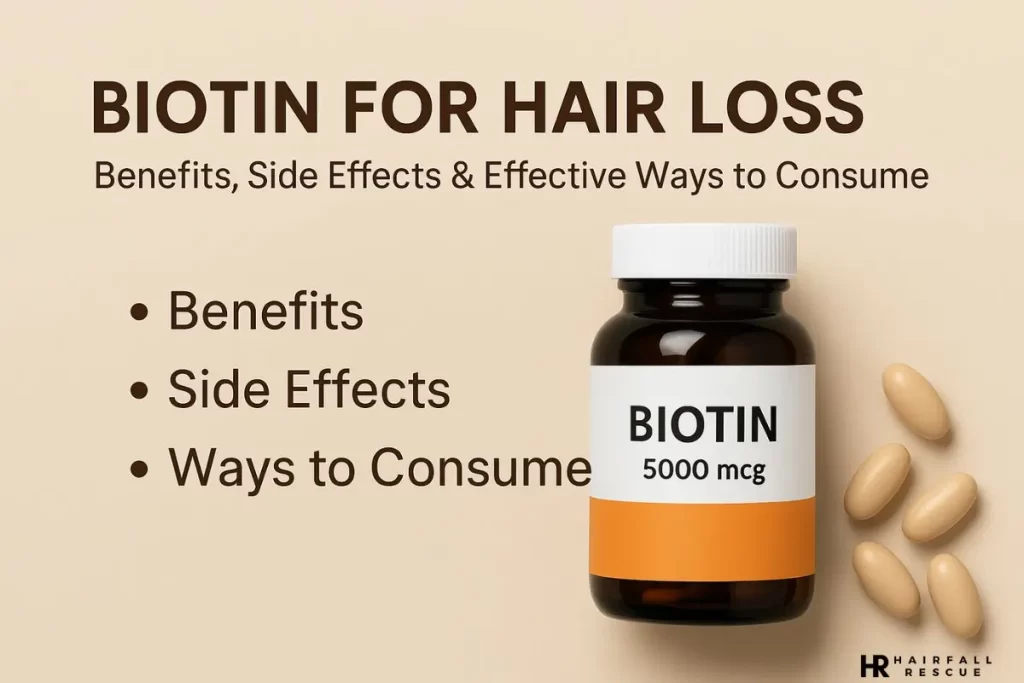
Introduction
Hair loss has become a very common problem these days. Whether it’s men or women, almost everyone faces hair fall issues at some point in life. Whenever we talk about hair care supplements, Biotin is one of the most popular names that comes up.
But what exactly is Biotin?
Does it really help in controlling hair loss?
Are there any side effects?
And what’s the best way to take it?
In this blog post, we’ll explore what biotin is, how it works for hair fall, its benefits, side effects, and the most effective ways to consume it.
What is Biotin?
Biotin, also known as Vitamin B7, is a water-soluble vitamin that plays an important role in maintaining healthy hair, skin, and nails. It also supports the body’s metabolism by helping convert food into energy.
Biotin is naturally present in many foods like:
- Egg yolks
- Almonds
- Soybeans
- Kale
- Broccoli
- Mushrooms
- Whole grains
It improves the body’s ability to process proteins, which is essential for strong and healthy hair.
How Does Biotin Help in Hair Loss?
Hair loss often happens when the hair roots don’t receive enough nutrients. One major reason can be a biotin deficiency.
Biotin helps by:
- Boosting keratin production (keratin is the main protein found in hair)
- Supporting the growth cycle of hair follicles
- Strengthening hair roots
- Reducing split ends and hair breakage
People who suffer from hair thinning and hair fall due to lack of biotin often notice improvement after including biotin in their daily routine.
Benefits of Biotin for Hair
Here are some of the most important benefits of biotin for hair health:
1. Supports Hair Growth
Biotin naturally promotes hair growth by supporting the creation of healthy new hair follicles.
2. Reduces Hair Fall
Regular intake of biotin helps reduce hair fall by strengthening hair strands and roots.
3. Makes Hair Thicker and Shinier
Biotin improves hair texture, making it thicker, shinier, and healthier.
4. Improves Hair Texture
Consuming biotin regularly makes hair soft, silky, and smooth.
5. Prevents Split Ends
Biotin helps prevent split ends and hair damage caused by weak hair shafts.
Side Effects of Biotin
Although biotin is generally safe for most people, taking too much can sometimes cause side effects. Here are a few possible issues:
1. Acne or Pimples
Some people may develop acne or breakouts when consuming high doses of biotin.
2. Digestive Issues
Excessive biotin can cause problems like nausea, bloating, or stomach cramps in some people.
3. Allergic Reactions
Though rare, allergic reactions like skin rashes or itching may occur.
4. Affects Blood Test Results
Biotin can interfere with certain blood tests and give incorrect results, so it’s important to inform your doctor if you’re taking biotin supplements.
5. Overdose Risks
Very high doses can put pressure on the liver and may lead to other health problems. Always follow the recommended dosage.
Effective Ways to Consume Biotin
If you want to include biotin in your daily routine, here are the best ways to do it:
1. Through Natural Foods
The safest way is to eat biotin-rich foods like:
- Egg yolks
- Almonds
- Walnuts
- Mushrooms
- Kale
- Spinach
- Broccoli
- Sweet potatoes
A balanced diet is usually enough to meet your daily biotin needs.
2. Biotin Supplements
If you have a biotin deficiency or hair loss problem, you can take biotin tablets or capsules as per your doctor’s advice.
Supplements usually range from 5000 mcg to 10000 mcg.
Tip: Always choose good quality, certified supplements.
3. Biotin Gummies
Flavored biotin gummies are also available these days, which are easy to consume and taste better than tablets.
4. Biotin-Based Hair Products
There are several shampoos, hair oils, and conditioners containing biotin that help strengthen hair from the outside.
Recommended Biotin Dosage
The ideal biotin intake for adults is around 30-100 mcg per day, which can be easily fulfilled through a proper diet.
In cases of hair loss or deficiency, doctors may recommend up to 5000 mcg daily for a short period.
Important: Never take high doses without consulting a healthcare professional.
Conclusion
Biotin is a safe and effective vitamin that can help improve hair health, promote hair growth, and reduce hair fall. It strengthens the hair roots, improves texture, and gives you healthier, shinier hair.
However, like any supplement, it may have some side effects if taken in excess. So it’s always a good idea to start with natural biotin-rich foods and then move to supplements if necessary — but only after consulting your doctor.
If you’re dealing with hair fall or thinning, making biotin a part of your daily routine along with a balanced diet and proper hair care can definitely help.
FAQ (Frequently Asked Questions)
Q. Does biotin really stop hair fall?
Yes, biotin helps control hair fall by improving keratin production and strengthening hair roots.
Q. Are there any side effects of biotin?
Yes, high doses of biotin can cause acne, digestive issues, or allergic reactions in some people.
Q. How should I take biotin?
You can take biotin through natural foods, supplements, gummies, or biotin-based hair care products.
Q. What is the safe dosage of biotin?
The recommended daily intake is 30-100 mcg. In cases of hair loss, doctors may suggest up to 5000 mcg.


